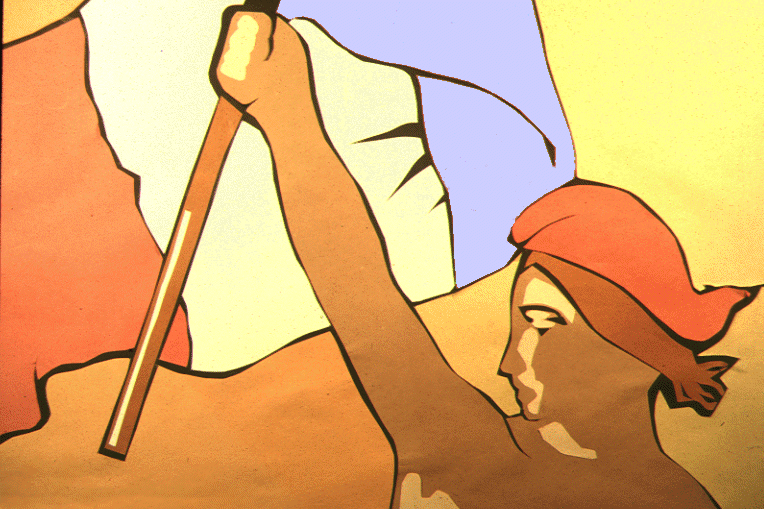The Republican Calendar

Fabre d'Eglantine was essentially a second-rater. Born Philippe Fabre, he
won, as a teenager, a poetry competition and a crown of eglantine, whose
name he attached to his own. He was a very minor poet, an unsuccessful
tragedian, an unsubtle politician and a transparent crook. In his new post
he could get his hands on the wealth of the French East India Company, which
he happily plundered for eighteen months.
Meanwhile, everything was to be new. A new Legislative Assembly was elected,
known as the Convention. The King was deposed, the Republic was declared.
Old Provinces were replaced with new Départements. The Church was
nationalised, its property confiscated. Every aspect of French life was to
be republicanised, rationalised, secularised. The metric system and decimal
coinage are among the reforms retained to this day. Even the Calendar came
under fire.
Advanced thinkers had been grumbling about the Gregorian Calendar for a
number of years. It was untidy, illogical and priest-ridden; all those
feasts and saints' days, all those months of different lengths; imagine, the
first of a month could be any day of the week, when in strict logic it ought
always to be Monday! The old Calendar had to go.
Its replacement was entrusted to two mathematicians, Lagrange and Monge,
under the supervision of Charles-Gilbert Romme, the new Minister of
Education. Its use began in October 1793, but the Start Date, point zero,
the beginning of Year I, was September 22, 1792, date of the proclamation of
the French Republic; so New Year was at the Autumn Equinox.
The new Calendar was strictly logical, with the occasional amusing twist.
There were still twelve months, but each of these was of thirty days. The
week was replaced by the décade of ten days, the last day being a holiday.
The original plan was for decimal subdivision of the day as well, but this
proved unworkable.
'Ah but', you say, 'that only gives us 360 days. What about the other five
and a quarter?' You do well to ask. At the end of the year, between what
would have been September 17 and 22, came five days' holiday – six in a
leap-year. These extra days, named after the Common People who wore trousers
instead of breeches, were called Les Sansculottides – translated into
English by at least one satirist as 'Saint Knickerless' Days'. The period of
four years between leap-years, called by the Ancient Greeks an Olympiad, was
now to be known as a Franciade, and the extra day at the end of each
Franciade was a special celebration, the Feast of the Revolution.
Fabre d'Eglantine was one of the few members of the Government with
pretensions to poetry, and he was given the job of naming the months. Fabre
threw himself into his task with enthusiasm, knowing in his heart that this
was his sole chance of immortality.
The days, being decimal, were simply called primidi, duodi, tridi, quartidi
and so on up to décadi.
Fabre named each month after its salient feature. The first Republican
month, from September 22 to October 21, he called Vendémiaire –
Wine-harvest. Next came Brumaire – misty and Frimaire – Frosty. The month
including old-fashioned Christmas was Nivose – snowy. After that came
Pluviose (rainy), Ventose (windy), and a truly poetic sequence of Germinal
(seedtime), Floréal (blossom time), Prairial (the month of meadows),
Messidor (harvest-time), Thermidor (summer heat), and finally Fructidor
fruit-bringer.
Which is why the events of succeeding years have such strange names. It was
on 17 Floréal, Year II, that Fabre, along with Danton and a dozen friends,
went to the guillotine for the corruption proved against them by
Robespierre. It was on 9 Thermidor that Robespierre himself followed them;
and it was the coup d'état of 18 Brumaire, Year VIII, that brought to power
Napoleon Bonaparte, who as Emperor in 1806 finally returned France to the
Gregorian Calendar, in line with the rest of Europe which he had conquered.
Footnote: in England at the same time George Ellis, writing as 'Sir Gregory
Gander', suggested a similar renaming of the months. His list made a little
rhyme which children used to learn. Starting, naturally, in January, it
goes:
Snowy, Flowy, Blowy,
Showery, Flowery, Bowery,
Hoppy, croppy, droppy, Breezy, Sneezy, Freezy.